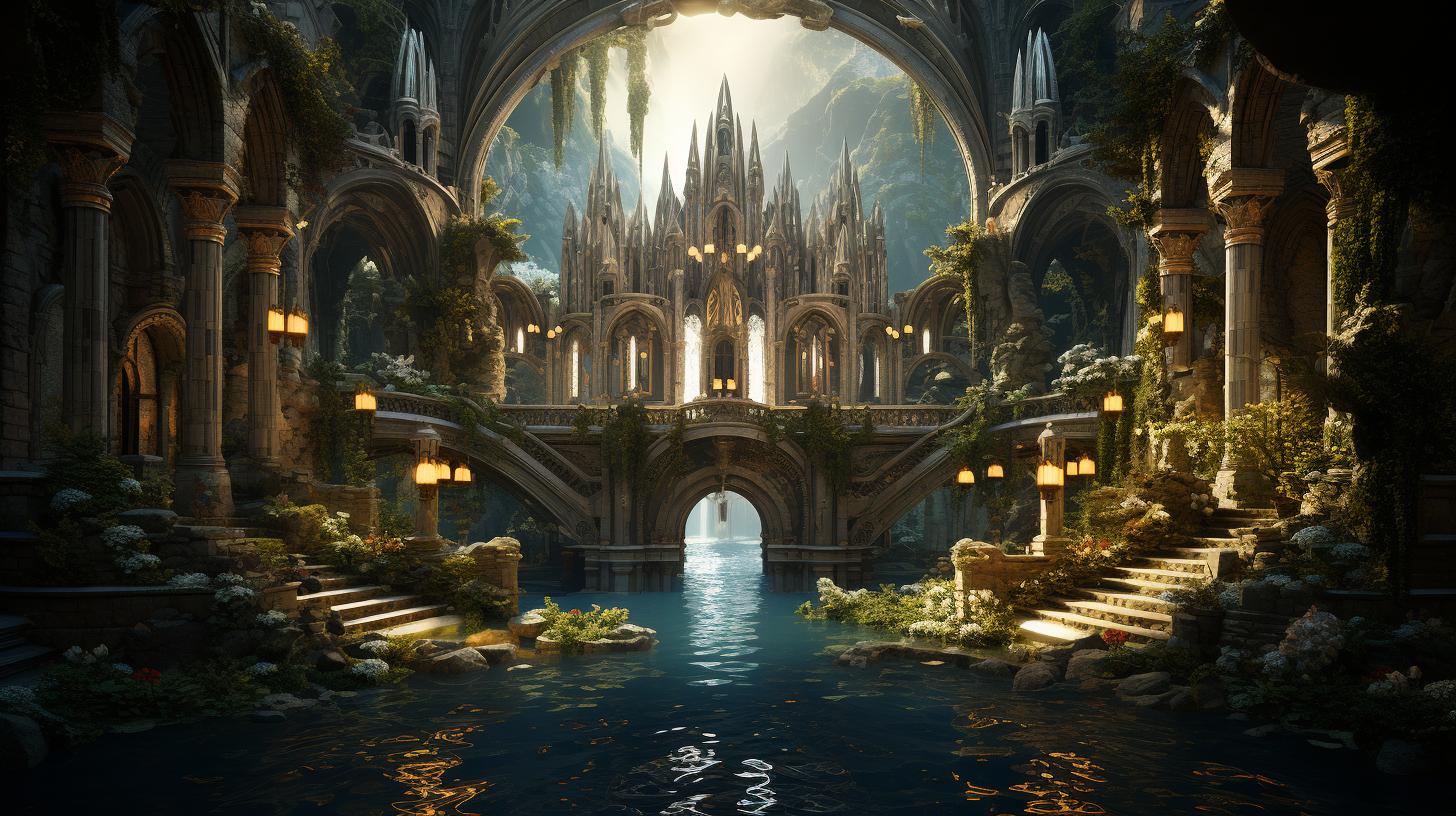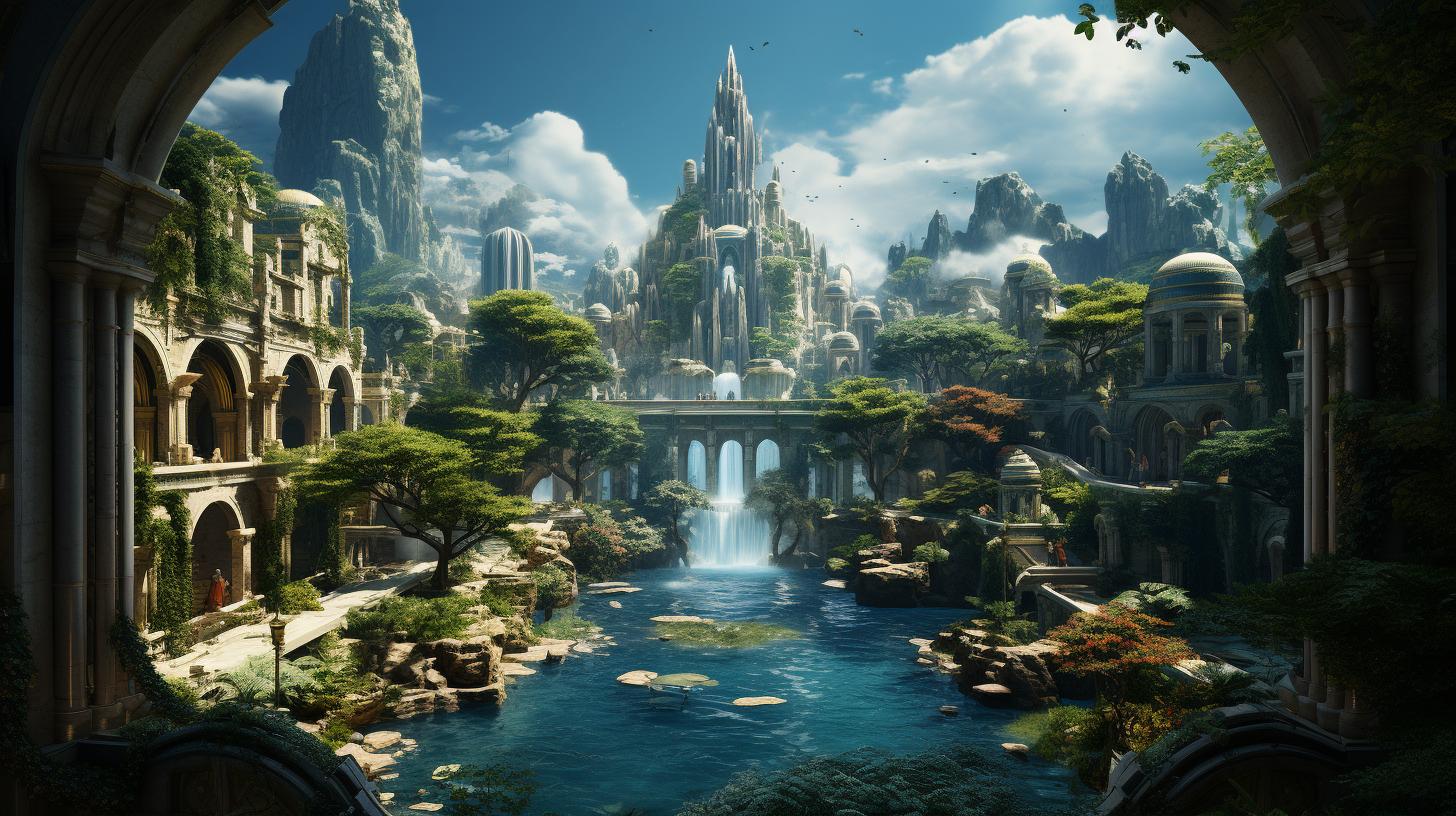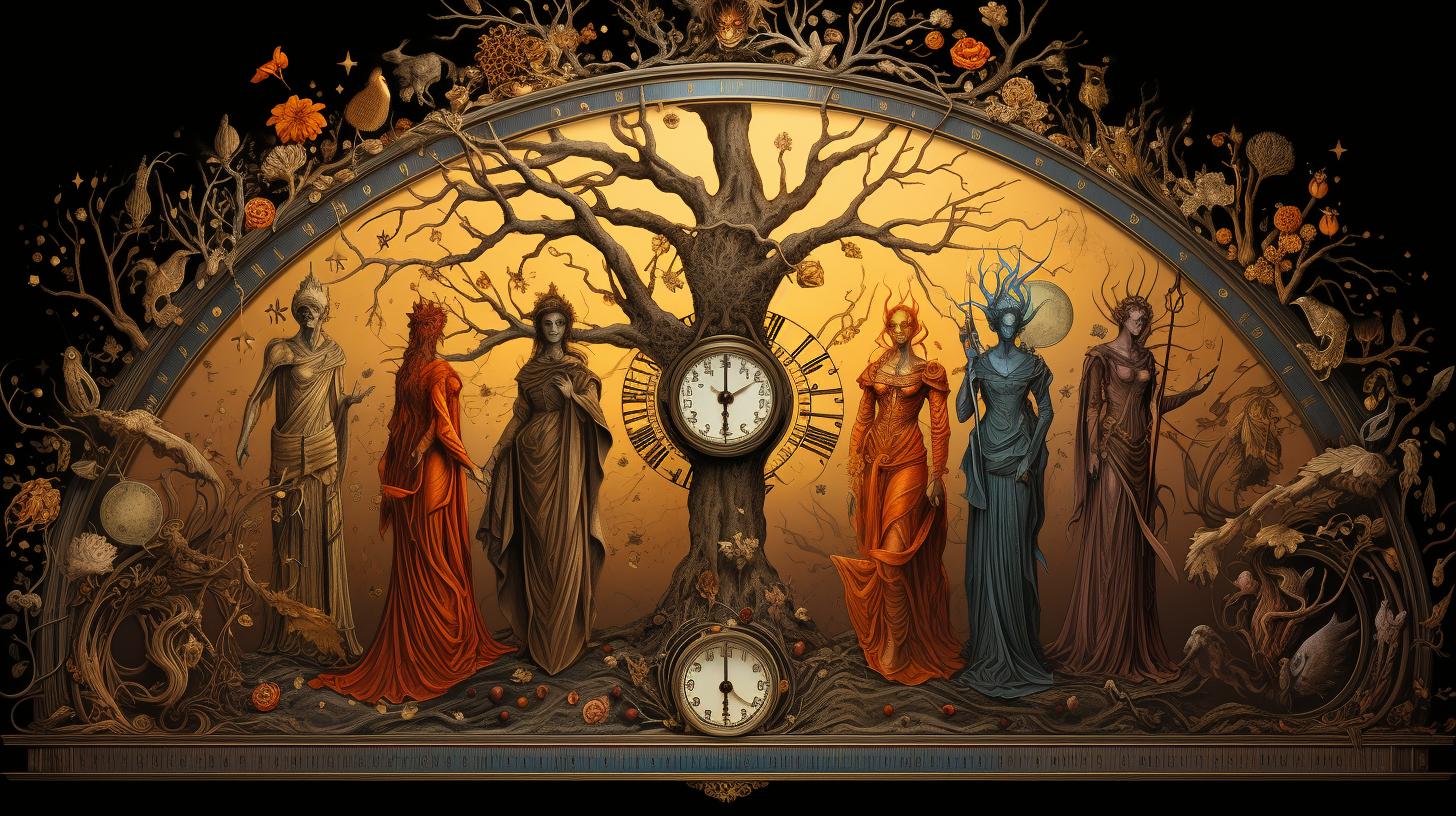What is Elysium in Greek Mythology: Exploring the Afterlife in Ancient Greece

The concept of Elysium in Greek mythology refers to a realm of the afterlife where the righteous, heroes, and those connected to the gods could reside. Initially separate from the Greek underworld, Elysium evolved over time to include the chosen ones deemed worthy by the gods.
Located in the western edge of the Earth, near the Ocean, Elysium was also known as the “Fortunate Isles” or the “Blessed Isles,” with descriptions of lush parks and activities. Various rulers were associated with Elysium, including Cronos and Radamantis, and its significance extends to modern interpretations and cultural symbolism.
The word’s etymology remains uncertain but may relate to the Greek verb meaning “to relieve” or “to liberate.”
The Origins of Elysium in Greek Mythology
The concept of Elysium holds a significant place in Greek mythology, representing a heavenly realm associated with the afterlife. This section explores the meaning and concept of Elysium, its portrayal in ancient Greek literature, and its connection to the Greek underworld.
Elysium Meaning and Concept
Elysium, in Greek mythology, embodies the idea of an idyllic paradise reserved for those worthy of a blessed afterlife. Initially, only mortals with divine connections and heroes were permitted entry to Elysium, separate from the realm of Hades. Over time, the concept expanded to include individuals chosen by the gods and those who led righteous and heroic lives.
Elysium in Ancient Greek Literature
Elysium’s presence can be traced through various works of ancient Greek literature. Homeric texts, such as the Odyssey, make reference to Elysium as a reward for the worthy, while Hesiod and Pindar speak specifically of a paradise reserved solely for heroes.
The descriptions of Elysium depict it as a place of joy, where residents engage in athletic and musical pursuits.
The Greek Underworld: Hades and Elysium
Elysium exists as a distinct realm within the Greek underworld, separated from the darkness of Hades. According to Greek mythology, Elysium was positioned on the far western edge of the Earth, near the mythical river Océano.
As a counterpart to the realm of Hades, Elysium offered a blissful existence, contrasting the realm of the dead with a place of eternal happiness and fulfillment.
Exploring Elysian Fields in Greek Mythology
In this section, we delve into the realm of Elysian Fields in Greek mythology, a place of heavenly bliss for the chosen ones.
We will explore the various descriptions and locations associated with Elysian Fields, shedding light on its significance in ancient Greek literature and beliefs.
Descriptions and Locations of Elysian Fields
The ancient Greeks envisioned Elysian Fields as a paradise where mortal heroes and those favored by the gods could find eternal happiness. Descriptions of Elysian Fields varied over time, but it was often portrayed as a place of lush landscapes, abundant natural beauty, and pleasant climates.
While there is no precise location explicitly mentioned in Greek mythology, there are multiple accounts suggesting its placement. According to some, Elysian Fields resided at the western edge of the Earth, near the majestic Océano river.
The imagery of this idyllic land conjured visions of a harmonious existence for the blessed.
The White Island: Paradise for Heroes
One aspect of Elysian Fields, sometimes referred to as the White Island, was reserved exclusively for the heroic figures of Greek mythology. This paradise offered a serene haven where heroes could experience everlasting joy and indulge in their favorite pastimes.
Here, they could engage in athletic competitions and immerse themselves in the harmonious melodies of music.
The White Island epitomized divine rewards for heroic deeds, providing an eternal reward for those who demonstrated exceptional courage and virtue during their mortal lives.
The Champs Elysées: Heavenly Realm of the Blessed
Another depiction of Elysian Fields is found in the concept of the Champs Elysées, translated as the “Elysian Fields” or the “Elysian Plain.” This heavenly realm was believed to be a dwelling place for the blessed and virtuous souls.
It was a realm of pure joy and contentment, where the righteous could bask in everlasting bliss.
The Champs Elysées stood as the epitome of a divine paradise, a realm reserved for those deserving of a peaceful and fulfilling afterlife.
Its beauty and tranquility were unparalleled, making it a coveted destination for those seeking eternal happiness.
Elysium in the Epics and Poems
Elysium, a prominent concept in Greek mythology, finds its place in various epic poems and literary works. These narratives provide different perspectives on the nature and characteristics of this divine realm.
Elysium in Homer’s Odyssey
In Homer’s epic poem, The Odyssey, Elysium is depicted as a place of bliss and reward for heroes and virtuous individuals. These exceptional souls enjoy eternal happiness, far removed from the hardships experienced by ordinary mortals.
Although only briefly mentioned, Elysium serves as an inspiration for the protagonists as they strive to attain glory and honor.
Elysium in Hesiod and Pindar’s Works
Hesiod and Pindar, renowned poets of ancient Greece, explore Elysium in greater detail. They emphasize the exclusivity of this paradise, reserving it only for those who have achieved greatness and divine favor.
Hesiod presents Elysium as a realm of eternal pleasure, where the righteous dwell alongside the gods themselves. On the other hand, Pindar portrays Elysium as a haven where heroes engage in athletic and musical endeavors, reveling in their glorious accomplishments.
Asphodel Meadows and Other Depictions of Elysium
Additional interpretations of Elysium can be found in various works of literature and mythological texts. The Asphodel Meadows, often associated with Elysium, are described as a tranquil area where average souls spend their afterlife.
These depictions highlight the diversity of beliefs surrounding Elysium, presenting alternative perspectives on the rewards and experiences that await the souls who reach this idyllic realm.
Rulers and Residents of Elysium
Elysium, in Greek mythology, is governed by prominent deities and inhabited by various figures that hold significance in the afterlife realm.
Let’s explore the rulers and residents of Elysium in more detail:
Cronos and Rhadamanthys: Gods Who Govern Elysium
According to some accounts, Cronos, the Titan god, is mentioned as the ruler of Elysium. He ensures the harmony and bliss of the blessed souls residing in this paradise. Another notable figure associated with Elysium is Rhadamanthys, a son of Zeus known for his just and wise judgments.
It is believed that Rhadamanthys played a role in governing Elysium, upholding fairness and righteousness among its inhabitants.
Heroic Figures in Elysium
Elysium serves as a haven for heroes who have achieved great feats in their mortal lives. These heroic figures, such as demigods and renowned individuals like Hercules and Achilles, are granted eternal happiness and glory within the realms of Elysium.
Their courageous acts and noble deeds earn them a privileged place among the blessed in this divine afterlife destination.
Alleged Souls and Inhabitants of Elysium
While the specific identities of all inhabitants of Elysium are not explicitly mentioned in Greek mythology, various accounts suggest that those admitted include individuals chosen by the gods, the virtuous and just mortals, and heroes who have gained favor with the divine.
These fortunate souls are said to bask in the eternal pleasures of Elysium, relishing in activities such as athletic pursuits and musical enjoyment.
Comparisons with Other Afterlife Realms
Contrasting Elysium with Hades’ Realm
Elysium and the realm of Hades in Greek mythology present contrasting visions of the afterlife. While Elysium is depicted as a paradise for the chosen few, Hades’ realm is associated with darkness and suffering.
Elysium offers a peaceful existence filled with bliss and enjoyment, contrasting with the gloomy and somber landscape of Hades. The distinctions in the realms reflect the Greek beliefs in rewarding virtue and heroism while punishing wickedness.
Connections to Other Divine Realms
In addition to its contrast with Hades’ realm, Elysium also shares connections with other divine realms in Greek mythology. It is often associated with Olympus, the dwelling place of the gods, as heroes residing in Elysium enjoy their divine favor.
Furthermore, Elysium’s location near the edge of the Earth, close to the river Oceanus, suggests a connection to the limitless expanse beyond the mortal realm, emphasizing its divine nature.
Elysium in the Context of Heaven and Hell
While Elysium shares similarities with the concept of heaven in other religious traditions, it is important to note key distinctions.
Unlike the idea of an eternal reward in heaven, Elysium is not considered the ultimate destination for all souls. It is reserved for those specifically chosen by the gods and those who have lived righteous and heroic lives.
In contrast, the concept of hell, associated with punishment and eternal torment, differs significantly from the blissful existence promised in Elysium.
Cultural Significance and Modern Interpretations
Elysium in Art, Literature, and Popular Culture
Elysium’s rich mythological background has inspired countless works of art, literature, and popular culture. Painters, sculptors, and other artists have depicted the idyllic landscapes of Elysium and portrayed its residents enjoying eternal bliss.
Writers and poets have woven tales of heroes seeking entrance to this divine realm, adding depth to their narratives. In popular culture, Elysium often symbolizes a utopian paradise or a place of ultimate happiness and fulfillment.
From paintings and sculptures to novels, films, and video games, Elysium continues to captivate audiences worldwide.
Symbolism and Meaning of Elysium Today
Although ancient Greek mythology forms the basis of Elysium’s symbolism, its meanings have evolved over time. Elysium has come to represent various concepts, such as a peaceful afterlife, a reward for virtuous actions, or a metaphor for personal achievement and fulfillment.
Symbolically, it can signify the pursuit of happiness, the quest for eternal peace, or the longing for a better existence beyond this life. Today, Elysium serves as a symbol of hope, aspiration, and the desire for a paradisiacal existence.
Influence of Elysium in Western Thought and Beliefs
Elysium’s influence extends beyond Greek mythology and permeates Western thought and beliefs. It has inspired philosophical and spiritual discussions on the nature of the afterlife, the concept of paradise, and the rewards granted to the righteous.
Elysium’s depictions in literature, art, and religious texts have shaped cultural perceptions of heaven, influencing ideas about divine realms, eternal happiness, and the qualities that define a virtuous life. Its legacy can be seen in religious traditions, literary works, and cultural references throughout Western civilization.
Unraveling the Etymology of Elysium
The etymology of the word ‘Elysium’ has intrigued scholars for centuries, as its origins and exact meaning remain uncertain. By analyzing linguistics and exploring possible derivations, researchers have sought to shed light on the true essence of this mystical realm.
Linguistic Analysis of the Word ‘Elysium’
Delving into the linguistic roots of ‘Elysium,’ experts have discovered intriguing connections and potential significances. The term was originally an adjective in ancient Greek, such as ‘pedion Elysion’ (the Elysian plain) or ‘domos Haidou’ (the house of Hades).
Possible Origins and Derivations
While the definitive origin of ‘Elysium’ remains elusive, scholars propose various theories.
One suggestion is that it may derive from the Greek verb ‘eleusô’ (eleuthô), meaning ‘to relieve’ or ‘to liberate’ from pain or troubles. Another possibility is its connection to the eleusinian mystery cults, which were associated with initiation rites and the pursuit of spiritual liberation.
These linguistic investigations offer tantalizing glimpses into the potential meaning and origins of ‘Elysium,’ but definitive conclusions remain elusive. Further research and exploration are required to unravel the full etymological significance of this enigmatic term.
Exploring Elysium: Fact or Fiction?
Delving into the historical context and evolution of Elysium provides insights into its existence and significance. By examining its interpretation within the context of Greek mythology and exploring modern perspectives and debates, we can shed light on the myths and realities surrounding this mythical realm.
Historical Context and Evolution of Elysium
Understanding the historical context of Elysium requires examining its development over time. From its initial separation from the Greek Underworld to its expanded criteria for admission, Elysium’s concept evolved, influenced by various sects and religious beliefs throughout ancient Greek history.
Interpreting Elysium in the Context of Greek Mythology
Interpreting Elysium within the framework of Greek mythology requires examining its descriptions in ancient literary works. We explore portrayals in Homer’s Odyssey, the works of Hesiod and Pindar, and depictions of the Asphodel Meadows to gain a comprehensive understanding of this mythical realm.
Modern Perspectives and Debates Surrounding Elysium
Examining modern perspectives and debates surrounding Elysium reveals its enduring cultural significance. Analyzing its portrayal in art, literature, and popular culture provides insights into its symbolism and the contemporary perception of this mythical realm.
Additionally, we explore the influence of Elysium on Western thought and beliefs, as well as ongoing debates about its existence and implications.
.




















